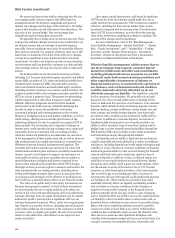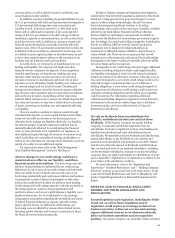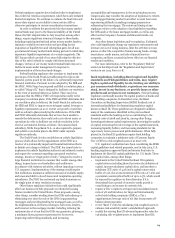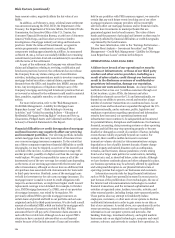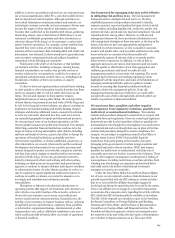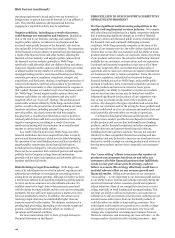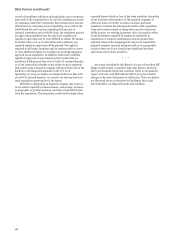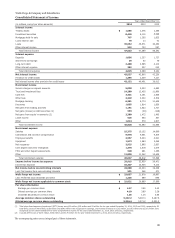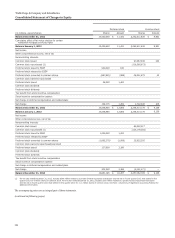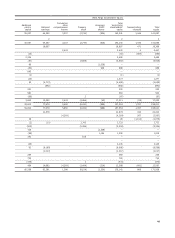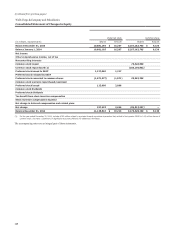Wells Fargo 2014 Annual Report Download - page 128
Download and view the complete annual report
Please find page 128 of the 2014 Wells Fargo annual report below. You can navigate through the pages in the report by either clicking on the pages listed below, or by using the keyword search tool below to find specific information within the annual report.Risk Factors (continued)
reporting requirement is broad and covers any domestic or
foreign entity or person that may be deemed to be an affiliate of
ours. The potential sanctions and reputational harm for
engaging in a reportable activity may be significant.
Negative publicity, including as a result of protests,
could damage our reputation and business. Reputation
risk, or the risk to our business, earnings and capital from
negative public opinion, is inherent in our business and has
increased substantially because of the financial crisis and our
size and profile in the financial services industry. The reputation
of the financial services industry in general has been damaged as
a result of the financial crisis and other matters affecting the
financial services industry, and negative public opinion about
the financial services industry generally or Wells Fargo
specifically could adversely affect our ability to keep and attract
customers. Negative public opinion could result from our actual
or alleged conduct in any number of activities, including
mortgage lending practices, servicing and foreclosure activities,
corporate governance, regulatory compliance, mergers and
acquisitions, and disclosure, sharing or inadequate protection of
customer information, and from actions taken by government
regulators and community or other organizations in response to
that conduct. Because we conduct most of our businesses under
the “Wells Fargo” brand, negative public opinion about one
business could affect our other businesses and also could
negatively affect our “cross-sell” strategy. The proliferation of
social media websites utilized by Wells Fargo and other third
parties, as well as the personal use of social media by our team
members and others, including personal blogs and social
network profiles, also may increase the risk that negative,
inappropriate or unauthorized information may be posted or
released publicly that could harm our reputation or have other
negative consequences, including as a result of our team
members interacting with our customers in an unauthorized
manner in various social media outlets.
As a result of the financial crisis, Wells Fargo and other
financial institutions have been targeted from time to time by
protests and demonstrations, which have included disrupting
the operation of our retail banking stores and have resulted in
negative public commentary about financial institutions,
including the fees charged for various products and services.
There can be no assurance that continued protests and negative
publicity for the Company or large financial institutions
generally will not harm our reputation and adversely affect our
business and financial results.
Risks Relating to Legal Proceedings. Wells Fargo and
some of its subsidiaries are involved in judicial, regulatory and
arbitration proceedings or investigations concerning matters
arising from our business activities. Although we believe we have
a meritorious defense in all significant litigation pending against
us, there can be no assurance as to the ultimate outcome. We
establish reserves for legal claims when payments associated
with the claims become probable and the costs can be reasonably
estimated. We may still incur legal costs for a matter even if we
have not established a reserve. In addition, the actual cost of
resolving a legal claim may be substantially higher than any
amounts reserved for that matter. The ultimate resolution of a
pending legal proceeding, depending on the remedy sought and
granted, could materially adversely affect our results of
operations and financial condition.
For more information, refer to Note 15 (Legal Actions) to
Financial Statements in this Report.
RISKS RELATED TO OUR INDUSTRY’S COMPETITIVE
OPERATING ENVIRONMENT
We face significant and increasing competition in the
rapidly evolving financial services industry. We compete
with other financial institutions in a highly competitive industry
that is undergoing significant changes as a result of financial
regulatory reform and increased public scrutiny stemming from
the financial crisis and continued challenging economic
conditions. Wells Fargo generally competes on the basis of the
quality of our customer service, the wide variety of products and
services that we can offer our customers and the ability of those
products and services to satisfy our customers’ needs, the pricing
of our products and services, the extensive distribution channels
available for our customers, our innovation, and our reputation.
Continued and increased competition in any one or all of these
areas may negatively affect our market share and results of
operations and/or cause us to increase our capital investment in
our businesses in order to remain competitive. Given the current
economic, regulatory, and political environment for large
financial institutions such as Wells Fargo, and possible public
backlash to bank fees, there is increased competitive pressure to
provide products and services at current or lower prices.
Consequently, our ability to reposition or reprice our products
and services from time to time may be limited and could be
influenced significantly by the actions of our competitors who
may or may not charge similar fees for their products and
services. Any changes in the types of products and services that
we offer our customers and/or the pricing for those products and
services could result in a loss of customers and market share and
could materially adversely affect our results of operations.
Continued technological advances and the growth of e-
commerce have made it possible for non-depository institutions
to offer products and services that traditionally were banking
products, and for financial institutions and other companies to
provide electronic and internet-based financial solutions,
including electronic payment solutions. We may not respond
effectively to these competitive threats from existing and new
competitors and may be forced to increase our investment in our
business to modify or adapt our existing products and services or
develop new products and services to respond to our customers’
needs.
Our “cross-selling” efforts to increase the number of
products our customers buy from us and offer our
customers all of the financial products that fulfill their
needs is a key part of our growth strategy, and our
failure to execute this strategy effectively could have a
material adverse effect on our revenue growth and
financial results. Selling more products to our customers –
“cross-selling” – is very important to our business model and key
to our ability to grow revenue and earnings especially during the
current environment of slow economic growth and regulatory
reform initiatives. Many of our competitors also focus on cross-
selling, especially in retail banking and mortgage lending. This
can limit our ability to sell more products to our customers or
influence us to sell our products at lower prices, reducing our net
interest income and revenue from our fee-based products. It
could also affect our ability to keep existing customers. New
technologies could require us to spend more to modify or adapt
our products to attract and retain customers. Our cross-sell
strategy also is dependent on earning more business from our
Wachovia customers, and increasing our cross-sell ratio – or the
average number of products sold to existing customers – may
126


